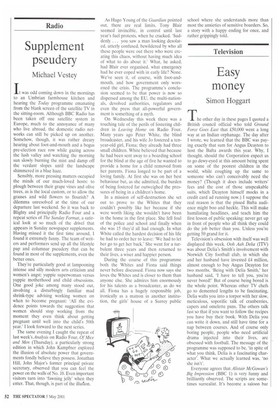Radio
Supplement pseudery
Michael Vestey
It was odd coming down in the mornings to an Umbrian farmhouse kitchen and hearing the Today programme emanating from the blank screen of the satellite TV in the sitting-room. Although BBC Radio has been taken off one satellite system in Europe, much to the annoyance of many who live abroad, the domestic radio networks can still be picked up on another. Somehow, though, it was rather dreary hearing about foot-and-mouth and a bogus pre-election race row while gazing across the lush valley and watching the morning sun slowly burning the mist and damp off the verdant slopes until the landscape shimmered in a blue haze.
Sensibly, more pressing matters occupied the minds of our much-loved hosts: to plough between their grape vines and olive trees, as is the local custom, or to allow the grasses and wild flowers to flourish? A dilemma unresolved at the time of our departure last weekend. So it was back to Blighty and principally Radio Four and a repeat series of The Sunday Format, a satirical look at so much of the drivel that appears in Sunday newspaper supplements. Having missed it the first time around, I found it extremely funny. The team of writers and performers send up all the lifestyle pap and columnar pseudery that can be found in most of the supplements, even the better ones.
They're particularly good at lampooning intense and silly modern arts criticism and women's angst: yuppie superwoman versus yuppie motherhood and child obsessions. One good joke among many stood out, involving a disturbingly familiar mad shrink-type advising working women on when to become pregnant: 'All the evidence points towards the suggestion that women should stop working from the moment they even think about getting pregnant until well into the child's 50th year.' I look forward to the next series.
The same evening I caught the repeat of last week's Analysis on Radio Four, Of Mice and Men (Thursday), a particularly strong edition in which John Kampfner explored the illusion of absolute power that governments fondly believe they possess. Jonathan Hill, John Major's former principal private secretary, observed that you can feel the power on the walls of No. 10. Even important visitors turn into 'fawning jelly' when they enter. That, though, is part of the illusion. As Hugo Young of the Guardian pointed out, there are real limits. Tony Blair seemed invincible, in control until last year's fuel protests, when he cracked. 'Suddenly . , . you saw a man looking desolated, utterly confused, bewildered by who all these people were out there who were creating this chaos, without having much idea of what to do about it.' What, he asked, had Blair ever organised, what emergency had he ever coped with in early life? None. We've seen it, of course, with foot-andmouth, and how government only worsened the crisis. The programme's conclusion seemed to be that power is now so dispersed among the EU, the multi-nationals, devolved authorities, regulators and even the press that all-powerful government is something of a myth.
On Wednesday this week there was a touching tale of the perils of fostering children in Leaving Home on Radio Four. Many years ago Peter White, the blind broadcaster, and his wife Jo fostered a tenyear-old girl, Fiona; they already had three small children. White believed that because he had been sent away to a boarding school for the blind at the age of five he wanted to provide a home for a child removed from her parents. Fiona longed to be part of a loving family. At first she was on her best behaviour but, as she admitted, the burden of being fostered far outweighed the pressures of being in a children's home.
In a mission of self-destruction she set out tcy prove to the Whites that they couldn't possibly like her because if she were worth liking she wouldn't have been in the home in the first place. She fell foul of the police and school and finally when she was 15 they'd all had enough. In what White called the hardest decision of his life he had to order her to leave: 'We had to let her go to get her back.' She went for a turbulent three years and then returned to their lives, a wiser and happier person.
During the course of this programme both the Whites and Fiona said things never before discussed. Fiona now says she loves the Whites and is closer to them than anyone else. She admires him enormously for his talents as a broadcaster, as do we all. Fiona has a hugely responsible job, ironically as a matron in another institution, the girls' house of a Surrey public school where she understands more than most the anxieties of sensitive boarders. So, a story with a happy ending for once, and rather grippingly told.










































































 Previous page
Previous page